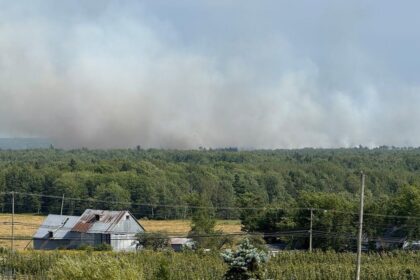PEIIt’s that time of year again. The days are getting shorter, the temperatures are dropping and the warm, sunny stretch of summer is behind us. While some enjoy this shift into fall and winter, for others the seasonal change can be mentally draining.Experts say movement, sunlight and social connection can help prevent seasonal strugglesThinh Nguyen · CBC News · Posted: Nov 01, 2025 5:00 AM EDT | Last Updated: 5 hours agoListen to this articleEstimated 5 minutesJana Burns, a peer support worker with CMHA, says the shift to colder weather and shorter days intensifies a general sense of not feeling good. (Canadian Mental Health Association)It’s that time of year again.The days are getting shorter, the temperature is dropping and the warm, sunny days of summer are behind us. While some enjoy this shift into fall and winter, others find seasonal change can be mentally draining.Staff at the Canadian Mental Health Association on P.E.I. say they see an increase in calls for support at this time of year. One of the biggest reasons: reduced daylight and fewer outdoor activities.“It’s the general sense of just not feeling good and having a lot of hard time with feeling depressed and anxious. It just intensifies this time,” Jana Burns, a peer support worker with CMHA, told CBC’s Island Morning.Get outside when you canBurns said there are simple steps people can take to protect their mental health as winter approaches, and one of the biggest is to get outdoors.“Just getting yourself outside in the daylight during the daylight hours is super helpful,” she said.LISTEN | Tips to protect your mental health as the days get darker:Island Morning7:40Tips to protect your mental health as the days get darkerAs summer fades and the days grow shorter, many people start to feel the effects on their mood. Jana Burns, a peer support worker with the Canadian Mental Health Association, joins us to share some tips to take care of your mental health during the darker months.Light therapy lamps are another option for people affected by seasonal depression, Burns said. Public libraries across P.E.I. offer them to borrow.Staying activeExercise can also make a big difference, Burns said.“I think people get scared of that, and they think it’s going to be something like super intense, but it doesn’t have to be, just being connected and active… Yoga and stretching or walking, those are simple things,” she said.Kailea Switzer, a counselling therapist based in Charlottetown, agrees keeping up movement is especially important in colder weather.Counselling therapist Kailea Switzer says movement can help regulate our mood and energy. (Submitted by Kailea Switzer)Even everyday activities, like shovelling snow to music or stretching, can help.“We know movement will regulate our mood and energy, and especially when natural light is low, it can create internal energy, even when you know the outside world is feeling more tiring,” Switzer said.Embracing the season, and each otherBurns said it can be difficult to motivate someone who’s struggling to be active. That’s when social connection matters most, even if it’s low-key.She suggests cozy activities like watching a show together, playing board games or sharing a warm drink. It’s all about embracing the cozy vibe of the season.“It’s those tiny little things that can sometimes make a difference in your comfort level,” she said.The change into colder weather and shorter days with reduced daylight can be mentally draining for some people. (Ben Nelms/CBC)Switzer agrees. She said one of the most important things people can do to cope with cooler weather is to embrace the season rather than resist it.“What people tend to do is like focus on wishing it was summer and counting down the days until the terrible weather is over. But I’ve noticed that people can feel a lot better if they take more of an open approach to winter,” Switzer said.That might look like finding a pair of snow pants, picking up used skates or cross-country skis from Facebook Marketplace, or even searching for the best hot chocolate on the Island.“Anything that allows you to get out of survival mode and trying to make winter something you can lean into trying to experience,” she said.Switzer added that being intentional about staying social is also vital for mental well-being in the colder months, when opportunities for connection don’t happen as naturally.“Often people will develop more social anxiety the more they stay in, so even though that can feel stressful to make those plans, we think of it as a prevention strategy so that we don’t get too lonely,” Switzer said.Reach out for helpSwitzer encourages people to pay attention if they notice themselves withdrawing, feeling more anxious or losing interest in things they enjoy. Reaching out early, like to a friend or a therapist, can make a big difference.“Try not to wait until things get too bad… because at that time, it becomes hard to have the energy to get the help,” she said.Burns said CMHA’s services are there to support Islanders.The CMHA’s peer support program offers support groups across the Island for people to participate in. (Lipik Stock Media/Shutterstock)The organization offers a peer support program where staff meet one-on-one with individuals. It’s self-referral and non-clinical, and all peer support workers have lived experience with mental health or addictions challenges.“People can come in and talk about what’s going on their life. [It’s a] judgment-free space. It’s 100 per cent confidential and just a safe space to kind of connect and hear from somebody else who has their own lived experience,” she said.There are also group sessions available as part of the peer support program. People can join support groups throughout the week, and there are options across the Island to choose from.Burns added that CMHA offers additional programs, including family programs and Life After Suicide Loss programs.People can reach out to the P.E.I. division of CMHA or visit its website to learn more about the supports available. If you or someone you know is struggling, here’s where to get help:Suicide Crisis Helpline: Call or text 988Kids Help Phone: 1-800-668-6868 (phone), live chat counselling on the website.Canadian Association for Suicide Prevention: Find a 24-hour crisis centre.This guide from the Centre for Addiction and Mental Healthoutlines how to talk about suicide with someone you’re worried about.With files from Island Morning
As days get shorter, Islanders reminded to check in on their mental health











